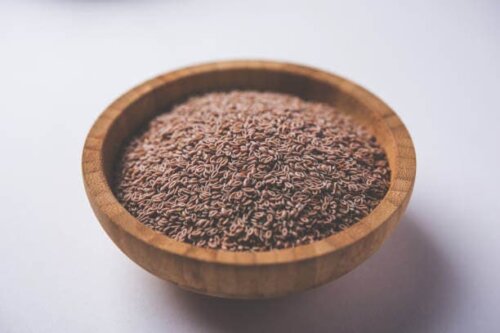5 Remedies that Can Help You Relieve Constipation

Are you looking for remedies to help you relieve constipation?
Constipation is a disorder that’s a real headache for those who suffer it chronically and may be forced to resort to laxatives. In this article, we’ll share some natural remedies that can help improve this problem and improve the well-being and quality of life of those who suffer from it.
Remedies to help you relieve constipation
For starters, chronic constipation is a disease that affects approximately a quarter of the population (between 15 and 25%). Although people can suffer from it at any age, it’s more common in women and older people, as this publication in Medicine – Programa de Formación Médica Continuada Acreditado points out.
This intestinal problem greatly worsens the quality of life of those who suffer from it. Therefore, it’s essential to make lifestyle and dietary changes to overcome this bothersome condition.
Here are some tips.
You should also read: Three Foods with Laxative Properties to Combat Constipation
1. Eat a diet rich in fiber.

The first remedy we present in this article is to increase your dietary fiber intake, especially if most of the food you eat is refined, as this study points out.
Fiber works in two ways in the intestine. First, it increases the volume of stool. Then, it accelerates transit in the colon. On the other hand, fiber nourishes beneficial intestinal bacteria.
To increase your fiber intake, you should include fruits, vegetables, whole grains, legumes, nuts, and seeds into your daily diet. On the other hand, it isn’t advisable to abuse of foods “fortified” with fiber or bran.
These recommendations are also valid for constipation in children, as long as said constipation isn’t related to a disease. Children may notice a great improvement in a short time with these dietary changes.
2. Drink more water.
Second, you can’t increase your fiber intake and forget about drinking enough water. This could even be counterproductive for the intestine and overall health since water helps fiber exert its action and increase its size.
This work conducted by researchers from the National University of San Marcos in Lima, Peru, indicates that there’s a relationship between a person’s consumption of liquids and constipation. Thus, experts recommend drinking at least 1.5 liters of water throughout the day between meals to digest the fiber you consumed.
Drinking water improves the frequency of bowel movement and improves stool consistency.
This article may interest you: Mango for Constipation: The Benefits and How to Prepare It
3. Enjoy regular physical activity.

Although not all studies are conclusive in this regard, some of them show positive results regarding the relationship between physical activity and constipation. In fact, practicing sports is a general recommendation to enjoy good overall health and quality of life.
Research published in the Canadian Journal of Gastroenterology and Hepatology shows that doing moderate or intense physical activity between 20 and 60 minutes three to five times a week improves constipation. Thus, in 12 weeks, people can observe improvements in intestinal discomfort related to this condition.
4. Consider probiotic supplements.
There’s an increasing worldwide demand for probiotic supplements. This is because these live microorganisms are beneficial for the intestinal bacterial flora and for overall health.
The same study we just mentioned in the previous section assessed the results of taking the probiotics Bifidobacterium and Lactobacillus. Such probiotics were effective in improving stool frequency and consistency in both adults and children.
However, experts don’t yet know whether a particular strain of probiotics is more effective than another. Thus, more studies are needed at the moment. For this reason, you can opt for those that include more variety of strains.
5. Try psyllium, a plant to relieve constipation.

Psyllium, or ispaghula, is a plant whose seeds help regulate intestinal transit and, therefore, relieve constipation. When mixed with water, it swells and creates a jelly that can help cleanse the gastrointestinal system.
Thus, psyllium may help improve stool frequency, consistency, and weight, as this study published in Alimentary Pharmacology & Therapeutics points out.
- The recommended dose is 6 to 12 grams a day.
- The most effective time to take it is on an empty stomach with two glasses of water and at least half an hour before breakfast.
- You can find it in herbalists and pharmacies.
- However, it’s always best to talk to your doctor before trying any new remedies.
To relieve constipation…
Now you know the good habits that help you relieve constipation. Therefore, it’s very important to improve intestinal transit to improve overall health and enjoy a good quality of life.
However, the best thing to do, before making any lifestyle habit changes, is to consult with a health professional so that they can provide an adequate diagnosis and treatment and you can ask them any questions you may have.
All cited sources were thoroughly reviewed by our team to ensure their quality, reliability, currency, and validity. The bibliography of this article was considered reliable and of academic or scientific accuracy.
- Garrido, A. S., Bermejo, A. P., Pomo, Y. J., & Soler, A. M. (2012). Estreñimiento. Medicine-Programa de Formación Médica Continuada Acreditado, 11(6), 331-336. https://www.sciencedirect.com/science/article/pii/S0304541212703098
- Bae, S. H. (2014). Diets for constipation. Pediatric gastroenterology, hepatology & nutrition, 17(4), 203-208. https://www.ncbi.nlm.nih.gov/pmc/articles/PMC4291444/
- Farre Javier, M. (2015). Estreñimiento funcional y su relación con la ingesta de fibra dietética, líquidos, actividad física y sobrepeso en adolescentes de dos instituciones educativas de La Molina-Lima 2014. http://cybertesis.unmsm.edu.pe/bitstream/handle/cybertesis/3972/Farre_jm.pdf?sequence=1&isAllowed=y
- Liu, L. W. C. (2011). Chronic constipation: current treatment options. Canadian Journal of Gastroenterology and Hepatology, 25(Suppl B), 22B-28B. https://www.ncbi.nlm.nih.gov/pmc/articles/PMC3206558/
- McRorie, J. W., Daggy, B. P., Morel, J. G., Diersing, P. S., Miner, P. B., & Robinson, M. (1998). Psyllium is superior to docusate sodium for treatment of chronic constipation. Alimentary pharmacology and therapeutics, 12(5), 491. https://static5.enetural.com/static/estudo_depuralina_fiber_27212.pdf
This text is provided for informational purposes only and does not replace consultation with a professional. If in doubt, consult your specialist.








